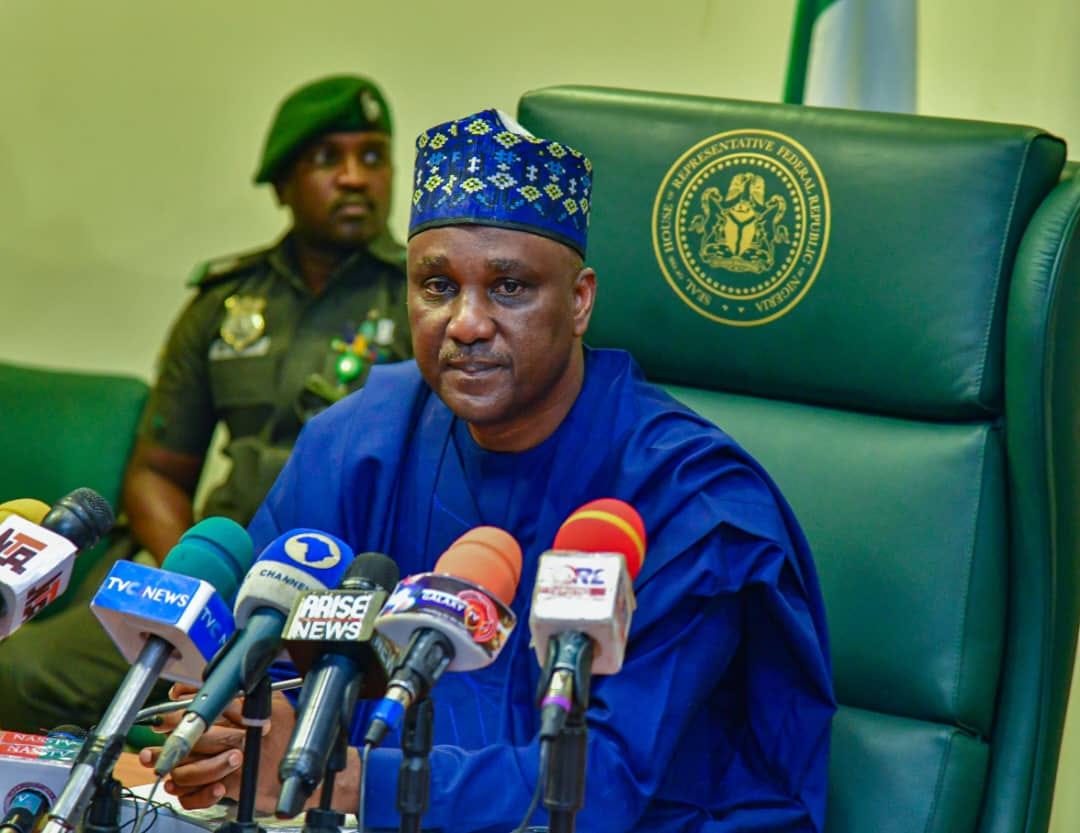770
By Tracy Moses
Speaker of the House of Representatives, Rt. Hon. Abbas Tajudeen, has commended stakeholders in Nigeria’s oil and gas industry for their steadfast dedication to repositioning the downstream petroleum sector, describing their collaboration with government institutions and labour unions as essential to national growth and sustainable energy development.
Speaking at the official opening of the inaugural edition of the Annual Downstream Petroleum Week held on Monday at the National Assembly Complex, Abuja, Abbas said the event represents a major step in Nigeria’s ongoing pursuit of energy reform and industrial renewal.
The programme was jointly organized by the House Committee on Petroleum Resources (Downstream) in collaboration with the Federal Ministry of Petroleum Resources and the Nigerian Midstream and Downstream Petroleum Regulatory Authority (NMDPRA).
The Speaker praised the initiative of the Committee Chairman, Ikeagwuonu Ugochinyere, and members of the committee for bringing together key industry players including the NNPCL, Dangote Group, PENGASSAN, and other vital sectoral bodies for meaningful engagement.
Abbas observed that the conference theme, “Celebrating Our Successes, Confronting Our Challenges and Finding Solutions for the Petroleum Downstream Sector,” underscores the nation’s readiness to evaluate progress, tackle constraints, and reinforce its commitment to transparency and resilience in the petroleum industry.
He noted that President Bola Ahmed Tinubu’s Renewed Hope Agenda has already triggered sweeping reforms and strategic investments that are transforming Nigeria’s energy landscape.
According to the Speaker, the start of operations at the Dangote Refinery represents a bold stride toward energy independence, while the establishment of other private refineries reflects renewed investor confidence. Abbas reaffirmed the National Assembly’s determination to create a favourable legislative and regulatory environment that will ensure the industry’s continued growth.
He described the Petroleum Industry Act (PIA) 2021 as a turning point in Nigeria’s oil and gas governance framework, restructuring the NNPC into a commercially viable entity and creating two critical regulatory bodies, the NUPRC and NMDPRA.
“The PIA restored investor confidence, curbed oil theft, and deepened transparency and competition in the sector,” Abbas said.
He charged participants to use the forum as a platform to propose workable solutions to persistent challenges such as pipeline vandalism, infrastructure deficits in the LPG and CNG value chains, pricing, and environmental sustainability. Abbas also assured that the House of Representatives would take into consideration the forum’s recommendations when shaping future policy directions.
In his address, Chairman of the House Committee on Petroleum Resources (Downstream), Hon. Ikenga Imo Ugochinyere, described the summit as “a new chapter in Nigeria’s energy journey,” aimed at institutionalizing innovation, inclusiveness, and accountability across the petroleum value chain.
He noted that the Annual Downstream Week would serve as a recurring platform for reviewing achievements, identifying challenges, and recalibrating policies that balance the interests of government, industry players, and labour organizations.
Ugochinyere lauded the steadfast support of Speaker Abbas, who was represented by Deputy Speaker Rt. Hon. Benjamin Kalu, as well as the participation of the Ministers of State for Petroleum Resources, Senator Heineken Lokpobiri and Rt. Hon. Ekperikpe Ekpo, alongside regulators and private sector leaders.
The lawmaker extolled the Petroleum Industry Act (PIA) and the removal of fuel subsidies as landmark policies that have enhanced efficiency, transparency, and investor confidence. He particularly praised the Domestic Crude Oil Supply Obligation (DCSO) policy of the NUPRC, which prioritizes local refining over crude exports, calling it “a decisive move toward self-sufficiency.”
According to Ugochinyere, the Committee is working on new legislative frameworks to fortify the downstream sector, including provisions to grant local refineries the first right of refusal on crude supply, simplify regulatory procedures, and enact a Refinery Protection and Promotion Bill to classify refineries as strategic national assets.
He also urged continued collaboration between government and private operators to maintain industrial peace and build on the progress achieved so far. Commending the resilience of organizations such as PETROAN, NOGASA, MEMAN, NARTO, IPMAN, NGA, and DAPPMAN, he said their efforts have kept petroleum products flowing despite economic headwinds.
“With unity of purpose and visionary leadership, Nigeria can emerge as Africa’s energy powerhouse,” Ugochinyere asserted.
Also speaking, Chairman of the House Committee on Agricultural Production and Services, Rt. Hon. Bello Ka’oje, reaffirmed the legislature’s determination to transform Nigeria’s agricultural sector through evidence-based policymaking and partnership with critical stakeholders.
Ka’oje emphasized that agriculture remains the foundation of Nigeria’s economy, providing a viable path to food security, job creation, and sustainable development. He encouraged farmers, researchers, policymakers, and development partners to collaborate in framing laws that are practical, inclusive, and forward-looking.
He lauded the commitment of the Speaker, the Ministers, and relevant agencies for championing agricultural transformation, expressing optimism that joint efforts will yield a resilient and food-secure nation.
“Our mission as lawmakers is to ensure that every piece of legislation translates into tangible progress for farmers and improves the lives of ordinary Nigerians,” Ka’oje said.



